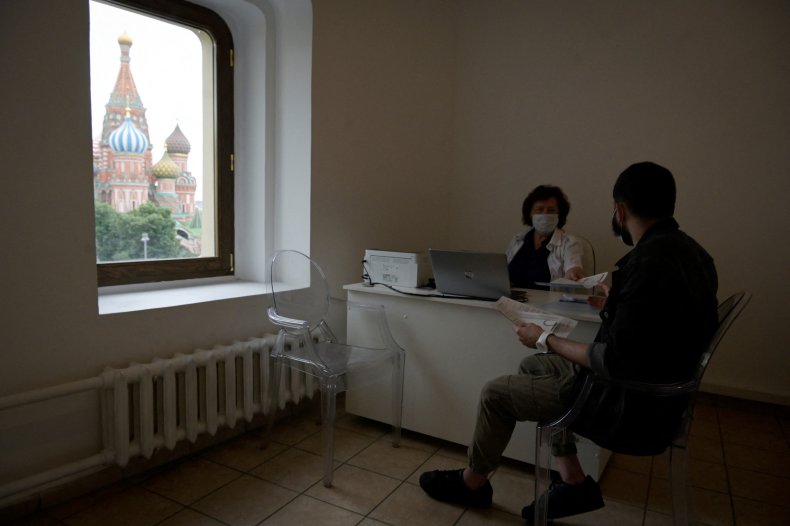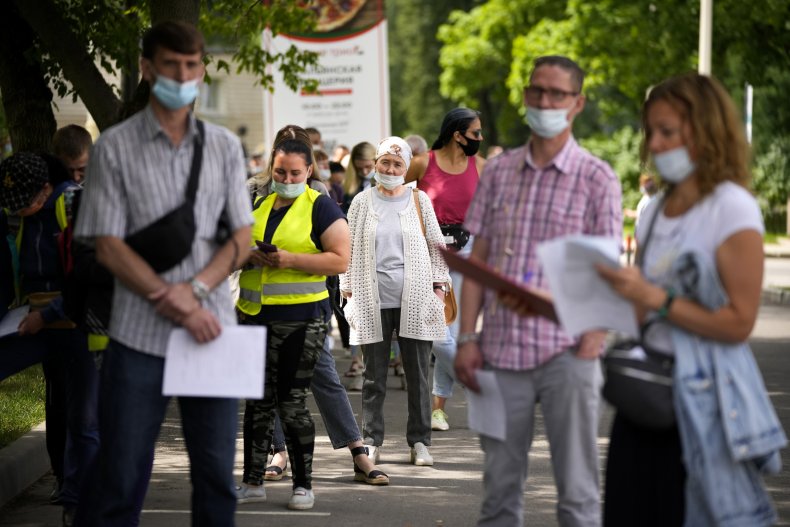Russia Reports Over 23K Coronavirus Cases but Has No Plans for Another Lockdown
Russia reported 23,218 new coronavirus cases on Friday, but no plans for a lockdown have been discussed, the Associated Press reported.
New infections have more than doubled their daily amount over the past month, going from 9,000 per week in early June to over 20,000 this week. The Moscow area and St. Petersburg account for nearly half of those new cases.
On Friday, Kremlin spokesman Dmitry Peskov told reporters, "No one wants any lockdowns." He added that the coronavirus situation in a number of the country's regions is "tense."
For more reporting from the Associated Press, see below:

Russian authorities reported a record-breaking 679 new coronavirus deaths on Friday, the fourth day in a row with the highest daily death toll in the pandemic.
The previous record, of 672 deaths, was registered on Thursday. Russia has struggled to cope with a surge in infections and deaths in recent weeks that comes amid slow vaccination rates.
"In order for it to continue not being discussed, we all need to get vaccinated as soon as possible," Peskov said.
Russian officials have blamed the rise in cases on Russians' lax attitude toward taking precautions, the growing prevalence of more infectious variants and slow vaccination rates. Although Russia was among the first countries to announce and deploy a coronavirus vaccine, just over 23 million people—or 15 percent of its 146 million population—have received at least one shot.
Experts have attributed the comparatively low vaccine uptake to widespread vaccine hesitancy and limited production capacity. Only 36.7 million sets of the four domestically developed vaccines have been released into circulation so far. Nevertheless, this week Russian health authorities gave a go-ahead to booster coronavirus vaccinations for people immunized more than six months ago.
Amid the latest surge of cases, about 20 Russian regions—from Moscow and St. Petersburg to the remote far-eastern region of Sakhalin—have made vaccinations mandatory last month for employees in certain sectors. The move seemingly helped ramp up the immunization drive in recent weeks but also elicited some pushback. Small protests against mandatory vaccinations erupted in Moscow and the Sakhalin region this week.
As of Monday, restaurants, bars and cafés in Moscow can only admit customers who have been vaccinated, have recovered from COVID-19 in the past six months or can provide a negative test in the previous 72 hours. Customers must visit a government website and get a QR code—a digital pattern designed to be read by a scanner.
Moscow authorities on Friday said that everyone with symptoms of a respiratory infection should self-isolate at least until they get a negative coronavirus test. "Starting from today, we will view all cases of acute respiratory infections as, highly likely, coronavirus infection," Deputy Mayor Anastasia Rakova said.
Russia's coronavirus task force has reported more than 5.5 million confirmed coronavirus cases in the pandemic and 136,565 deaths.
Russia had only one, six-week nationwide lockdown last spring, and the authorities have largely shunned tough restrictions that would require shutting down businesses ever since. Only one Russian region, the Siberian republic of Buryatia, has since had two local lockdowns, with the latest one in effect since Sunday.


